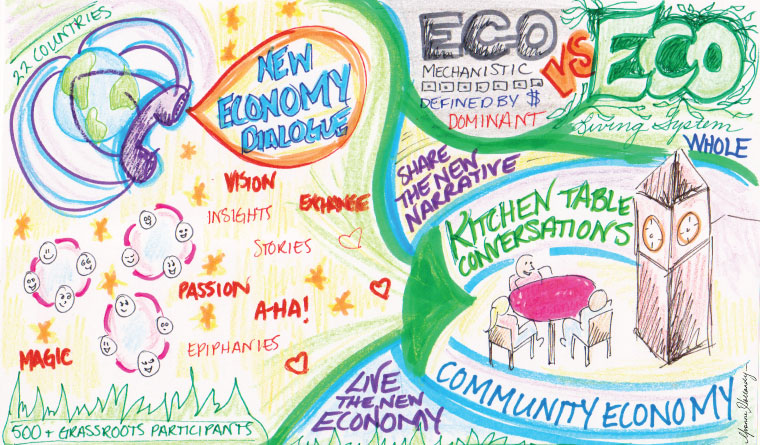
There’s a pretty good chance those of us joining a call about the new economy this week had all the knowledge to instantly trigger a wholesale jump to the new economy — if knowledge was all it took.
The question is always what shifts a person from brilliant insight to changing how and where she spends her money, her time, her thoughts. What moves the intellectually stirring discussion with globally-dispersed likeminded souls to kitchen table conversations with children and neighbours who think differently? What brings one to actually search out local social enterprises in order to buy from them, support them — or maybe even learn from them how to launch one’s own?
Knowledge is integral, of course — why we need a new economy, how the old economy is destroying Earth and us, what are the elements of the new versus the old.
A central point in this week’s call was also the critical need for a new cultural story — or at least the courage to live out the more promising story that already lies in most of our hearts but is being drowned out by the dominant narrative of scarcity and fear.
Visionary thinker Otto Scharmer also pointed to the need for new social technologies as a twin to the bold sharing of this new economy story.
We wonder if that is where the greatest magic lies — in creating the space for people with a similar passion to come together and have a certain sort of conversation.
Might we see more of those epiphanies and meaningful exchanges that seem to be the real fertilizer of profound change?
In Monday’s call, a MaestroConference hosted by international business coach and facilitator Charles Holmes, space was made for those types of connections.
Otto Scharmer and David Korten primed the call with their fabulous insights. Then folks were divided into random groups of three and four to share with each other.
From what I heard and experienced, magic did happen in those small groups. Epiphanies and meaningful exchanges happened as virtual strangers asked each other questions and shared insights and stories.
In my group, for instance, someone made the point that there really is enough for all, but the dominant economic theme is that there isn’t — that resources are scarce and must be hoarded. “Aaah,” said another group member, obviously struck by this observation.
Likely, they’d heard this idea before and in other places, but it was in this space and time that the insight seemed to spark something fresh for them.
What’s working me most now is one of my group member’s stories about an intentional community prototype in Scotland he’s joined. Now I’m mulling over how that fits in with my childhood experiences of growing up in a very locally rooted economy in Central America. I now have sharper clarity on a question that’s been floating in the back corners of my mind for awhile: Is the local economy the ultimate end, or is it one means to a greater end?
It’s been proposed that another apt term for the new economy is community economy. I like that too. Community economy suggests to me soul-enriching connectivity as we undertake business activity that has had meaning and humanity restored to its very core.
It feels like that was in essence what was beginning to happen through the call this week – we were taking a baby step or two down the path of creating a community-minded economy.
In a sense we were living out the new economy.
It’s exciting to know plans are underway to continue a cycle of this narrative-making and soul-enriching connection around the subject of the new economy.
You can comment on this blog below, or e-mail michelle(at)axiomnews.com.





